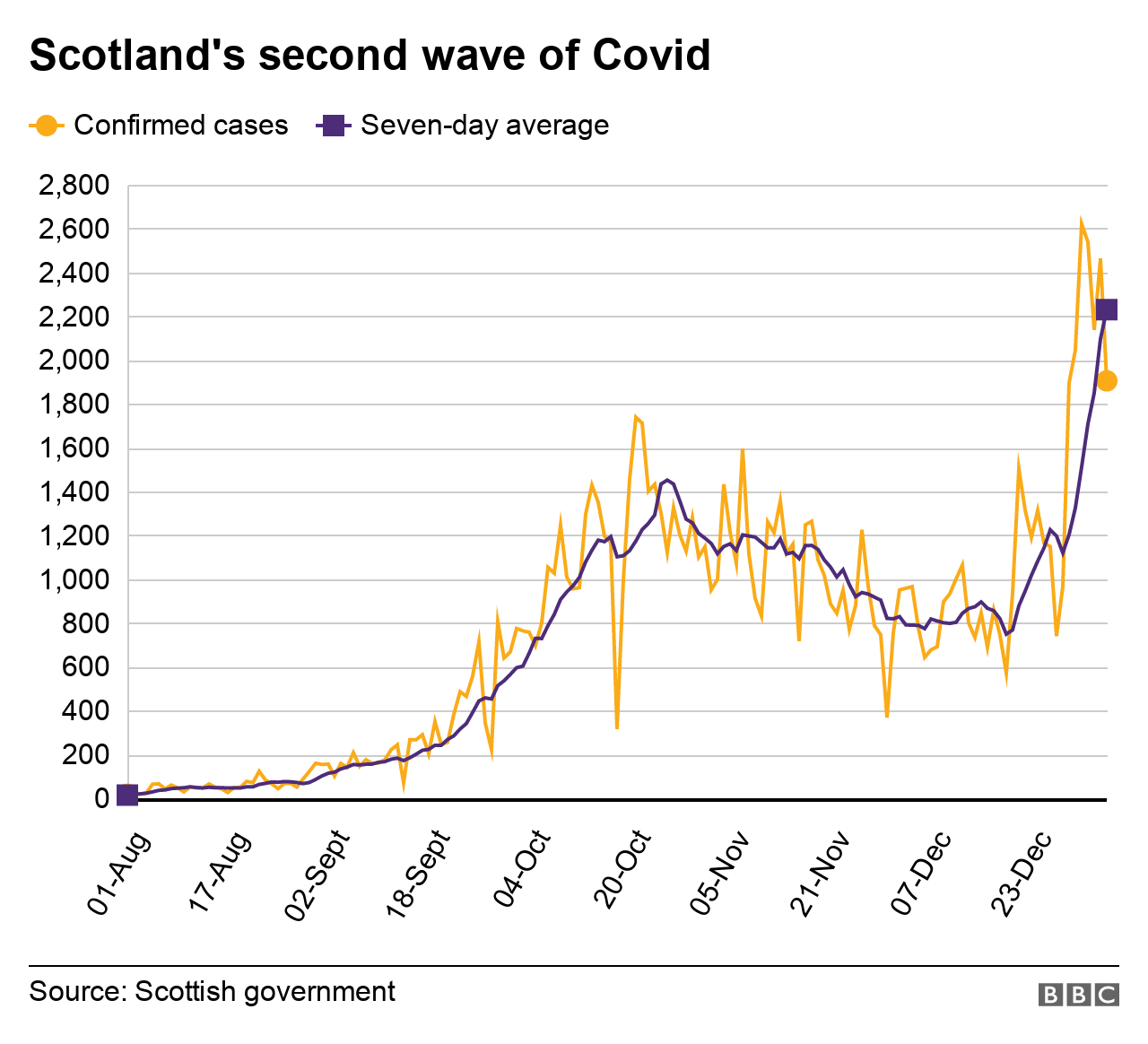Covid in Scotland: 'Stay at home' order comes into force
- Published
- comments
Sturgeon: Vaccination programme needs to win the race
Tough new lockdown restrictions forbidding people from leaving home for non-essential reasons have come into force across the Scottish mainland.
First Minister Nicola Sturgeon said the clampdown was necessary to contain the spread of the new strain of Covid-19.
People are now required by law to stay in their homes and to work from home.
Outdoor gatherings have been restricted to one-on-one meet-ups, and schools will close to most pupils until February at the earliest.
Ms Sturgeon told MSPs on Monday that Scotland faced an "extremely serious" situation, with the new, faster-spreading variant of coronavirus "a massive blow".
Schools will remain closed to most pupils until at least the beginning of February.
The first minister has said she cannot guarantee when children will be allowed back in classrooms or when the latest lockdown restrictions will be lifted.
She also told the BBC's Good Morning Scotland programme on Tuesday that she hoped 2.7 million people in Scotland would have received one dose of the Covid vaccine by the middle of May.
She said: "I can't be definitive right now about when we will lift these restrictions.
"I have described this as a race - we've got the vaccine in one lane and we are trying to accelerate that.
"We've got the virus which has learned to run faster in the other lane and we've got to slow it down.
"Lockdown is about pushing rates of the virus back, and if we manage to do that then hopefully we will be able to start lifting restrictions while the vaccination programme is ongoing."
Highest case rate
A government document revealed, external there were now more than 90 patients in intensive care units, with new modelling suggesting that figure could more than double by early February.
The modelling sets out different scenarios with the most pessimistic predicting hospitals admissions could soar to more than 8,000 with over 700 patients requiring intensive care.
The document also revealed that Inverclyde - which a few weeks ago had relatively low levels of Covid - now has the highest case rate, almost 550 per 100,000 - while Dumfries and Galloway has seen its rate increase to 475 per 100,000.
Dundee City, East Ayrshire, East Renfrewshire, North Lanarkshire, Renfrewshire and the Scottish Borders all now have case rates exceeding 300 per 100,000.
Only limited data was released by the government in recent days but a full update on deaths, hospital admissions and local infection rates has now been issued.

Cases of Covid have risen sharply in recent days
The new restrictions came into force at midnight and are, in effect, an enhancement to the level four curbs already in place across the mainland and Skye.
They will run until at least the end of January and could yet be extended both in scope and duration.
Scotland's island communities, with the exception of Skye, are to remain in level three for now, although Ms Sturgeon warned this would also remain under review.
New regulations mean Scots are prohibited from leaving their homes for anything other than "essential" purposes - although the law provides a lengthy list of examples of "reasonable excuses", external.
These include shopping for food or medical supplies, providing or accessing childcare, exercise, and participation in extended households.
Anyone who can do their job from home must do so, and people in the "shielding" category have been advised not to go out to work at all.
Nicola Sturgeon announces stay at home rules in new lockdown
New restrictions have been placed on outdoor gatherings in level four areas, with only two people from separate households now permitted to meet up.
These restrictions do not include children under the age of 12, who are still allowed to gather to play, but everyone else must abide by them or face a fixed penalty notice.
Travel restrictions remain in place between local authority areas and in and out of Scotland, and people have been urged to stay as close to home as possible when going out for exercise.
Schools will now operate on a remote-learning basis for the majority of pupils when the new term starts on 11 January, with only the children of key workers and vulnerable children to receive face-to-face teaching.
This is to run until at least 1 February, with a review on 18 January - with Ms Sturgeon saying her "fundamental priority" was still to get children back in school full time as quickly as possible.
'Vaccine vs virus'
The new measures are a bid to control the spread of the new variant of Covid, which is now thought to be responsible for nearly half of all new cases of the virus in Scotland.
Officials believe Scotland is roughly four weeks behind London - where health services are coming under increasing pressure - and warn that hospitals could hit capacity within the month without major new curbs.
Between 23 and 30 December, the average number of cases per 100,000 people in Scotland increased by 65%, from 136 to 225.

